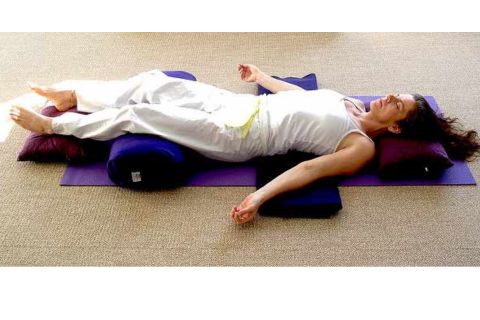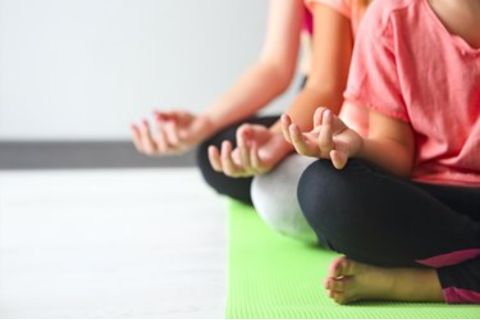In today’s fast-paced world, sleep deprivation has become a common issue, affecting millions of people worldwide. The consequences of inadequate sleep are far-reaching, impacting our physical, mental, and emotional well-being. Sleep is essential for our bodies to repair and restore themselves, and it plays a crucial role in cognitive function, memory consolidation, and mood regulation.
Yoga, an ancient mind-body practice, has emerged as a powerful tool for improving sleep quality. Through a combination of physical postures, breathing techniques, and mindfulness practices, yoga can effectively reduce stress, anxiety, and insomnia, promoting deeper, more restorative sleep.

The Science Behind Yoga and Sleep
Yoga’s ability to enhance sleep stems from its multifaceted approach to well-being. Here are some of the key mechanisms by which yoga promotes restful sleep:
Stress Reduction
Yoga’s gentle physical movements, deep breathing exercises, and meditative techniques effectively lower stress hormones, such as cortisol, and activate the parasympathetic nervous system, responsible for relaxation and rest. When we are stressed, our bodies are in a state of “fight or flight,” which can make it difficult to fall asleep and stay asleep. Yoga helps to calm the mind and body, creating a state more conducive to sleep.
Muscle Tension Release
Many people have difficulty sleeping due to muscle tension. Yoga poses target specific muscle groups, releasing tension and alleviating aches and pains that can interfere with sleep. For example, poses that stretch the hips and hamstrings can help to relieve lower back pain, which is a common cause of sleep problems.
Mindfulness Cultivation
Yoga cultivates mindfulness, the practice of focusing on the present moment without judgment. This can help quiet racing thoughts and anxieties that often disrupt sleep. When we are caught up in worrying about the past or the future, it can be difficult to relax and fall asleep. Yoga helps us to focus on the present moment, which can help to reduce anxiety and promote sleep.
Improved Melatonin Production
Melatonin is a hormone that regulates the sleep-wake cycle. Yoga has been shown to increase melatonin levels, promoting better sleep initiation and maintenance. This is because yoga helps to regulate the body’s natural circadian rhythm, which is responsible for determining when we feel sleepy and awake.

Yoga Techniques for Better Sleep
Incorporating yoga into your daily routine can significantly improve your sleep quality. Here are some specific yoga techniques to consider:
Bedtime Yoga Routine
Establish a regular bedtime yoga routine, practicing for 15-30 minutes before bed. Focus on gentle, restorative poses that promote relaxation and stress reduction. Some good poses to include in your bedtime routine are Child’s Pose, Legs-Up-the-Wall Pose, and Corpse Pose.
Deep Breathing Exercises
Practice deep breathing techniques, such as diaphragmatic breathing and alternate nostril breathing, to calm the nervous system and promote relaxation. Deep breathing helps to slow the heart rate and lower blood pressure, which can help to prepare the body for sleep.
Mindfulness Meditation
Incorporate mindfulness meditation into your yoga practice to cultivate present-moment awareness and reduce racing thoughts. Mindfulness meditation can help to reduce anxiety and stress, which can interfere with sleep.
Restorative Yoga Poses
Focus on restorative yoga poses, such as supported child’s pose, reclined bound angle pose, and legs-up-the-wall pose, which promote deep relaxation and release tension. Restorative yoga poses are designed to be held for longer periods of time, allowing the body to fully relax and surrender to the pose.

Recommended Yoga Poses for Sleep
Here are some specific yoga poses that are particularly beneficial for promoting sleep:
Child’s Pose (Balasana): This gentle pose stretches the back, hips, and thighs while calming the mind and reducing stress.
Legs-Up-the-Wall Pose (Viparita Karani): This pose inverts the body, promoting lymphatic drainage, reducing leg tension, and inducing relaxation.
Corpse Pose (Savasana): This final resting pose of yoga practice allows the body and mind to fully surrender to relaxation and prepare for sleep.
Reclined Bound Angle Pose (Supta Baddha Konasana): This pose gently opens the hips and inner thighs, promoting relaxation and reducing lower back tension.
Seated Forward Bend (Paschimottanasana): This pose stretches the spine, hamstrings, and shoulders, releasing tension and promoting relaxation.

Additional Tips for Improving Sleep
While yoga is a powerful tool for improving sleep, it’s essential to combine it with other healthy sleep habits to achieve optimal results. Here are some additional tips to promote restful sleep:
Establish a Regular Sleep Schedule
Go to bed and wake up at consistent times each day, even on weekends, to regulate your body’s natural sleep-wake cycle. This will help to train your body to expect sleep at certain times, making it easier to fall asleep and wake up feeling refreshed.
Create a Relaxing Bedtime Routine
An hour before bed, engage in calming activities, such as reading, taking a warm bath, or listening to soothing music. Avoid stimulating activities, such as watching TV or working on the computer, which can make it difficult to fall asleep.
Regular Exercise
Engage in regular physical activity, but avoid strenuous exercise close to bedtime. Exercise can help to improve sleep quality, but it’s important to avoid exercising too close to bedtime, as it can energize the body and make it difficult to fall asleep.
Seek Professional Help
If you continue to experience sleep problems despite implementing these strategies, consult a healthcare professional. There may be underlying medical conditions that are contributing to your sleep problems, which can be treated with medication or other interventions.

Conclusion
Yoga is a safe and effective way to improve sleep quality. By incorporating yoga into your daily routine and following other healthy sleep habits, you can achieve more restful and restorative sleep, leading to improved physical, mental, and emotional well-being.
